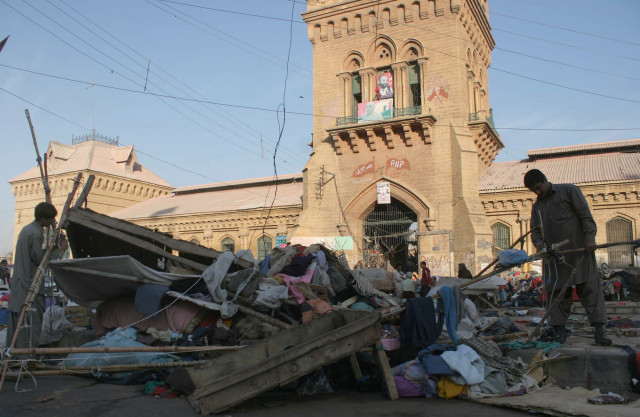
Land encroachment in cities has become a serious problem, one that authorities are seemingly unable - or unwilling - to tackle head on.
Islamabad
Pakistan’s federal capital stands in stark contrast to other cities including provincial capitals for being a well-planned city. The master plan, prepared by Greek architectural firm Konstantinos Apostolos Doxiadis in 1960, laid out a capital free from all sorts of problems that plague an expanding city.
However, more than half a century after its establishment, the situation has clearly taken a drastic turn for the worse. Today, Islamabad is fast acquiring the look of an ill-planned metropolis, one afflicted with the menace of encroachments.
In one way or another, various groups and departments seem to be encouraging encroachments.
Security agencies and foreign missions cite security concerns and fence areas surrounding their offices. Often, public streets and main roads are closed down by erecting concrete blocks. In this vein, around 19 embassies operating in residential areas have encroached upon land in their vicinity. The headquarters of the ISI, the air force and the navy are also in the city. Along Khayaban-e-Suharawardy, there is an entire road encroached by the ISI to protect its building, while the Pakistan Rangers have damaged the habitat of Margalla Hills National Park by building concrete structures.
Markets, especially those catering to lower and middle income groups, are flooded with encroachments, and shopkeepers do not even spare footpaths.
In 2012, the capital’s civic agency estimated that 6,819 acres of Islamabad’s land worth billions of rupees is under adverse possession or is encroached upon by individuals or powerful land grabbers.
In 2011, a Pakistan Muslim League-Nawaz legislator tabled the Capital Development Authority (Amendment) Bill 2011, seeking to declare grabbing of state land a cognisable offence.
And yet, the bill is still pending in Parliament. Existing laws against the crime are limited to mere fines or confiscation of materials from the encroached land.
Lahore
The illegal occupation of public land seems to be an ongoing problem in Lahore, as well, despite the tall claims of the administration.
Encroachments are not only taking a toll on businesses but are also wrecking the beauty of city’s rich architecture. This is evident from the extended shops in the narrow streets to stalls on footpaths in almost all main markets.
The ‘crackdown’ against encroachers is obviously not doing what is required. There have been operations, but their failure hinges upon the lack of political backing. The anti-encroachment operation launched two years ago in all nine towns of the city was brought to grinding halt just before it was scheduled for the walled city, a hub of the Pakistan Muslim League-Nawaz.
As a result of the halt, weeks of hard work went down the drain.
Lahore is controlled by three different authorities - the City District Government of Lahore (CDGL), Lahore Development Authority (LDA) and Walled City of Lahore Authority (WCLA).
CDGL is in charge of 32 main roads and all the old localities. In these areas, the operation aimed to get rid of vendors on main roads, extended counters, ramps and any other hindrance to traffic. LDA, mainly in charge of newly established localities and more than 150 roads, faced a multifaceted operation targeting many illegalities - it dealt with temporary encroachments such as construction of hedges outside private or commercial land, and permanent encroachments such as construction of a room or a wall in an area termed as an ‘open space’.
Just recently, the CDGL has launched another operation against encroachment in all nine towns. Several trucks full of material have been confiscated.
And yet, what is jarring is that the district administration always launches operations against road side vendors, whereas buildings constructed in violation of the by-laws are seldom targeted.
The newly-established WCLA has yet to kick start any aggressive crackdown.
Peshawar
In light of a recent crackdown, it seems that measures are being taken against encroachers in Peshawar. At least 32 people were arrested in an operation in different areas of the city on January 9.
It was the high court that ordered the district government to take action against the menace, after which traffic police officials went into action. Traffic DSP Asghar Marwat and Traffic DSP Zewar Khan led the drive.
According to Marwat, the drive was initiated from Motorway Square towards Ring Road, leading to Kohat Road. A number of makeshift hotels along roadsides and illegal vehicle stands were demolished.
“Thirty-two people, including drivers and contractors, were picked up and shifted to the lock up,” said Marwat. He explained how shopkeepers had already been informed multiple times to remove illegal structures erected by the roadside. However, they paid no heed to the warnings and continued to occupy government property. Thus, during the drive, these encroachments were removed.
As a part of the Khyber-Pakhtunkhwa government’s Green and Clean Peshawar Plan, Commissioner Munir Azam directed Assistant Commissioner Asad Haroon and Traffic SSP Khalid Hamdani to remove illegally erected telephones and electricity polls from Service Road.
Azam also directed authorities to shift the under-construction flyover from the Khyber Teaching Hospital to Speen Jumat Stop.
According to him, the operation was also conducted at Ashraf Road, GT Road and Firdous Bazaar. A number of encroachments were removed.
Karachi
Land grabbing heavily factors into turf wars between various groups in Karachi, but no serious efforts have been made by the government thus far to eliminate the practice. Public and private land, various housing schemes, societies, buildings and amenity plots are encroached upon by land grabbers. This is done by direct or indirect support of police, political parties and agencies.
“We have no exact figures of all area grabbed, but more than 10,000 acres of state land is encroached in Karachi alone,” said Zufikar Shah, in-charge of the survey wing of the provincial land utilisation department. He added that they have finished the modern imagery satellite survey of 681,000 acres in the city through the geographical information system.
Revenue department officials claim that while the digital survey can pinpoint the location of the encroached land, government action is needed to evacuate those areas. According to them, there is no dearth of resources to take action. Karachi Metropolitan Corporation, Karachi Development Authority and the Sindh government have set up different wings and cells and employed hundreds of people, but nothing is being done.
“I don’t want to talk about no-go areas in Karachi, but can [the] government evacuate the YMCA plot located in the red zone adjacent to the CM and Governor House? I think this is an example how our state machinery is inept,” said Saleem Khursheed Khokhar, a former MPA of the Pakistan Peoples Party.
The provincial government also has an Anti-Encroachment Cell in Karachi. “This cell is supposed to evacuate revenue land [belonging to the] Sindh government. Whenever the board of revenue or courts order us, we take action,” said the SSP of the cell.
According to him, 100 staffers are working in the city and more 1,200 cops are under training to be posted in various districts.
Shazar Shamoon, a senior member board of revenue who heads the provincial government’s land affairs, claims that thousands of acres of land have indeed been evacuated. However, the majority of cases relating to land encroachment are pending before various courts, he added. Action can only be taken after decisions are made.
Rawalpindi
For residents, especially motorists, of the garrison city, encroachment is one of the biggest problems. A major portion of roads and markets has been taken over in different localities.
These encroachments have birthed serious traffic issues. Encroachers occupy both sides of roads with carts, small stalls and other business setup, leaving no space for parking.
During rush hour, even the two-minute distance from Murree Road to IJ Principal Road takes almost 20 minutes to cover.
“Illegal parking on main roads causes immense problems for people and results in traffic jams,” said Muhammad Ayub, who lives on Liaqat Road. “Due to the negligence of authorities, shopkeepers and hawkers encroach upon pavements in crowded markets, leaving no room for pedestrians.”
A relatively recent survey pointed out that concerned departments have joined hands with the encroachers. The land grabbers allegedly pay Rs100 to Rs300 to the concerned departments on a daily basis, a charge that has been denied by the administration.
According to Tahir Khan, official spokesman for the Tehsil Municipal Administration, the administration has been taking action against encroachers. However, political interference often hinders action, he admitted.
Published in The Express Tribune, January 29th, 2014.


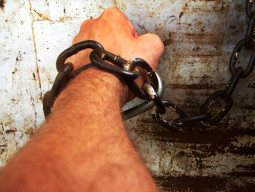
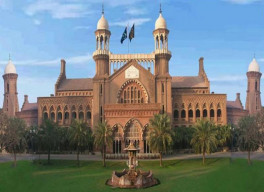




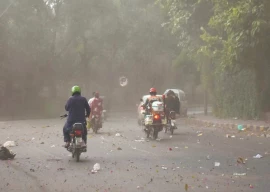

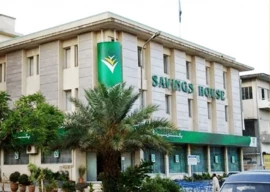
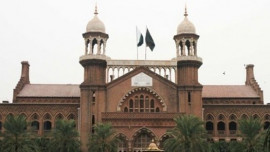





COMMENTS
Comments are moderated and generally will be posted if they are on-topic and not abusive.
For more information, please see our Comments FAQ